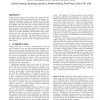Free Online Productivity Tools
i2Speak
i2Symbol
i2OCR
iTex2Img
iWeb2Print
iWeb2Shot
i2Type
iPdf2Split
iPdf2Merge
i2Bopomofo
i2Arabic
i2Style
i2Image
i2PDF
iLatex2Rtf
Sci2ools
137
click to vote
SIGMETRICS
2008
ACM
2008
ACM
Analysis of a gossip protocol in PRISM
Gossip protocols have been proposed as a robust and efficient method for disseminating information throughout dynamically changing networks. We present an analysis of a gossip protocol using probabilistic model checking and the tool PRISM. Since the behaviour of these protocols is both probabilistic and nondeterministic in nature, this provides a good example of the exhaustive, quantitative analysis that probabilistic model checking techniques can provide. In particular, we compute minimum and maximum values, representing the best- and worst-case performance of the protocol under any scheduling, and investigate both their relationship with the average values that would be obtained through simulation and the precise scheduling which achieve these values.
Related Content
| Added | 15 Dec 2010 |
| Updated | 15 Dec 2010 |
| Type | Journal |
| Year | 2008 |
| Where | SIGMETRICS |
| Authors | Marta Z. Kwiatkowska, Gethin Norman, David Parker |
Comments (0)

